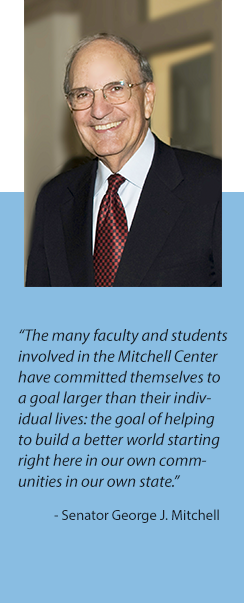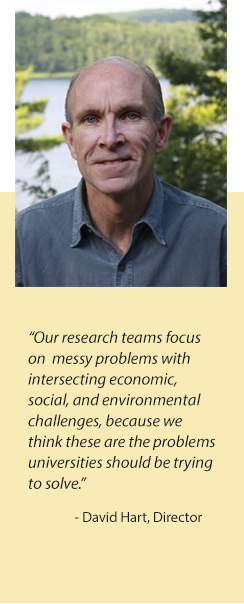Building the Road to Solutions
Successful Initiative Becomes Permanent Center for Sustainability

In 2006, a handful of researchers from across the University of Maine began meeting in a conference room newly converted from an old garage attached to the Senator George J. Mitchell Center. Little did they know how appropriate the setting would be: they were about to launch an innovative project from modest beginnings. Unlike garage start-ups such as Google, Apple and Harley-Davidson, however, this new endeavor focused not on making profits, but on solving real-world problems.
That might sound idealistic, but this unlikely mix of biologists and economists, engineers and anthropologists, foresters, legal scholars, and other researchers landed a 5-year, $20 million grant from the National Science Foundation’s EPSCoR program to launch Maine’s Sustainability Solutions Initiative (SSI) at the Mitchell Center in 2009. They rounded up colleagues from diverse disciplines—and engaged stakeholders from all sectors of society to join them—to create more than fifteen research teams collaborating with Maine communities to tackle some of the state’s most urgent sustainability challenges.
Six years later, these teams have helped communities around the State begin creating a more sustainable future. For example, they have played key roles in developing new renewable energy technologies, improving town-planning processes to better balance economic development and wetlands protection, and passing legislation to slow the spread of the invasive emerald ash borer.
Based on these and other accomplishments, SSI recently “graduated” from the NSF grant to become the Mitchell
Center for Sustainability Solutions. With more than 100 faculty from 11 Maine colleges and universities, 300-plus students and nearly 300 stakeholder organizations participating during the grant period, it created one of the largest research networks in the nation dedicated to advancing the emerging field of sustainability science, which seeks to improve human well-being while protecting the environment. This new statewide center aims to connect knowledge with action to create a sustainable future in and beyond Maine.

“Our research teams focus on messy problems with intersecting economic, social, and environmental challenges, because we think these are the problems universities should be trying to solve,” says David Hart, Mitchell Center Director.
At a time when recognition is growing that colleges and universities must become more responsive to society’s needs, the Mitchell Center is mapping a way. The Center’s unique approach builds on three key lessons that emerged from SSI: it’s essential to commit to solving problems rather than just studying them, stakeholders are crucial team members during the research process, and collaboration between university researchers from different fields is critical in solving sustainability challenges.
The Mitchell Center’s approach might sound obvious, but it’s surprisingly uncommon in academia. William Clark, Co-Director of the Sustainability Science Program at Harvard University’s John F. Kennedy School of Government, uses the analogy of automobile manufacturing. Clark, who delivered the 2014 Senator George J. Mitchell Lecture on Sustainability at UMaine, observed that had it been up to academia rather than business to invent the first car, the result might well have been a pile of sophisticated parts that couldn’t be assembled into a functional vehicle.
“As techies, we’re often fragmenters,” Clark said. He said that universities typically reward individual innovation rather than collaboration and “connectivity,” the more mundane tasks of putting the pieces together.
“The prescription for universities is what business…would call project management,” Clark said. “You organize people to build a car, and you’ll know when it’s delivered because someone can drive from Point A to Point B in an affordable way. This is not commonly the way universities are organized, which is why it is interesting to see Maine so far out front in introducing a solutions center.”
Sustainability Science: The Road Ahead
The innovative sustainability science research that is a hallmark of the Mitchell Center also is informing the new Sustainable Ecological Aquaculture Network (SEANET). Launched with a $20 million National Science Foundation grant to Maine EPSCoR last fall, the five-year program will establish a research  network focused on understanding the role of sustainable ecological aquaculture in coastal communities and ecosystems.
network focused on understanding the role of sustainable ecological aquaculture in coastal communities and ecosystems.
“This project builds on what SSI has done,” says Paul Anderson, director of Maine Sea Grant and the Aquaculture Research Institute at UMaine, who also directs SEANET. “We’ll be using similar approaches to sustainability science to study how Maine’s $120 million aquaculture industry can grow in ways that are socially acceptable and don’t harm the environment.” Anderson adds that SEANET also will grow interdisciplinary research networks and continue to build on SSI’s findings to educate the problem solvers of the future. “SSI studied itself,” Anderson says. “We can use this knowledge to teach faculty and graduate students how to do science better—in ways that continue to break down barriers and better serve the community.”
Ultimately, the Mitchell Center aims to help grow the capacity for solving sustainability problems by convening and supporting partnerships of researchers and stakeholders and facilitating the dissemination and exchange of new knowledge. This, in turn, can illuminate increasingly relevant and important roles for universities, including that of “honest brokers,” who don’t take sides in complex and contentious issues, but rather bring together all sides to create lasting solutions. “Universities can offer tremendous value to society by listening to all sides without taking sides, and by creating neutral ground where diverse perspectives and forms of knowledge provide the raw material for crafting innovative solutions to a wide range of sustainability challenges,” Hart says.
Such endeavors require a long-term vision, patience, and a passion for making a difference. This commitment is also at the center of Senator George Mitchell’s vision.
“The road to solutions is often long and winding. Persistence is essential to success,” Mitchell observed at his namesake lecture last fall. “In a larger sense, the ethos of [the Mitchell Center’s] work reflects one of my deepest beliefs: the importance of public service. The many faculty and students involved in the Mitchell Center have committed themselves to a goal larger than their individual lives: the goal of helping to build a better world starting right here in our own communities in our own state.”
